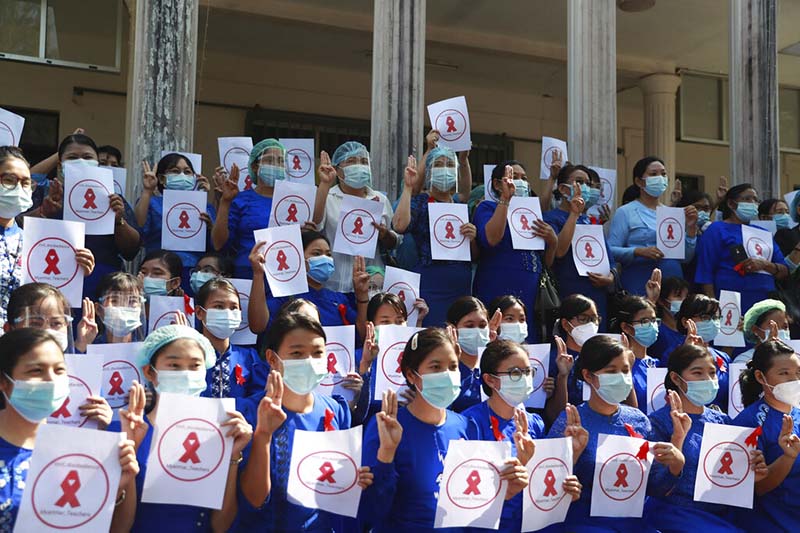

Nonviolent resistance to Myanmar’s military coup gathered steam Friday, with public protests extending to several regions, including the tightly controlled capital, Naypyitaw.
The military has tried to quash opposition with selective arrests and by blocking Facebook access to prevent users from organizing protests. Facebook is most people’s primary tool for accessing information on the internet, where traditional media is state-controlled or intimidated by threats of legal action by the state.
The latest politician detained is Win Htein, a senior member of the deposed ruling party, the National League for Democracy. He was seized at his home in Yangon, the country’s biggest city, and taken to Naypyitaw early Friday, party spokesman Kyi Toe announced.
The military’s takeover Monday began with the preemptive detention of senior government officials and politicians, including the country’s leader, State Counsellor Aung San Suu Kyi. She is healthy and remains under house arrest at her her official residence in Naypyitaw, Kyi Toe said.
Win Htein, 79, is Suu Kyi’s longtime confidante and had publicly called for civil disobedience in opposition to Monday’s coup. He told Britain’s BBC radio in a phone call early Friday that he was being arrested for sedition, which carries a maximum penalty of life imprisonment.
In Yangon, an estimated 200 teachers and professors on Friday held signs supporting civil disobedience and flashed a three-fingered salute signifying resistance, a gesture they adopted from anti-government protesters in neighbouring Thailand.
“We do not accept a government formed by themselves after they seized power illegally with guns from the government chosen by the public,” lecturer Dr Nwe Thazin said of the military. “We will never be together with them. We want that kind of government to collapse as soon as possible.”
At the same time nearby, a small number of staff from a university hospital held their own demonstration. They held signs saying “Protect Democracy” and “Reject the military coup.”
Protesters for three straight nights have shown their anger by banging pots and pans together in Yangon neighbourhoods under cover of darkness. Unconfirmed postings on social media said some participants in Thursday’s noise protests had been detained by police.
There were also demonstrations in the capital Naypyitaw on Friday, where medical staff at the city’s biggest hospital gathered behind a big banner condemning the coup. Medical personnel have been at the forefront of the civil disobedience campaign.
Naypyitaw city was purpose-built under a previous military government to be Myanmar’s administrative capital, which had been its biggest city, Yangon, until 2005. The capital is heavily militarized and lacks the tradition of political protest that Yangon has had for almost a century.
Another protest was held in Myanmar’s southern Tanintharyi Region, where about 50 chanting people marched, reported the online news agency Dawei Watch.
According to Myanmar’s Assistance Association for Political Prisoners, at least 133 officials or lawmakers and 14 civil society activists were detained by the military in connection with its takeover, though some have already been released. The NLD has said Suu Kyi and ousted President Win Myint are being held under minor charges unrelated to their official duties that will allow for their detention at least until mid-February.
The takeover has been criticized by President Joe Biden and others internationally who pushed for the elected government to be restored.
“The Burmese military should relinquish power they have seized, release the advocates and activists and officials they have detained, lift the restrictions on telecommunications, and refrain from violence,” Biden said Thursday at the US State Department in Washington, using Myanmar’s former name.
The UN Security Council, in its first statement on the matter, “stressed the need to uphold democratic institutions and processes, refrain from violence, and fully respect human rights, fundamental freedoms and the rule of law.” While the US and others have described the military’s actions as a coup, the Security Council’s unanimous statement did not.
The military seized power shortly before a new session of Parliament was to convene on Monday, declaring its actions were legal and constitutional because Suu Kyi’s government had refused to address voting irregularities. The state election commission had refuted the allegations of irregularities and confirmed Suu Kyi’s party won a landslide victory.
The military assumed all state powers, including legislative functions, during a one-year emergency. It also has formed a new election commission to investigate its allegations of voting irregularities and said it will hold a new election at the end of the state of emergency and turn over power to the winner.
Myanmar was under military rule for five decades after a 1962 coup, and Suu Kyi’s five years as leader had been its most democratic period, despite continued use of repressive colonial-era laws.
Source: RSS/AP